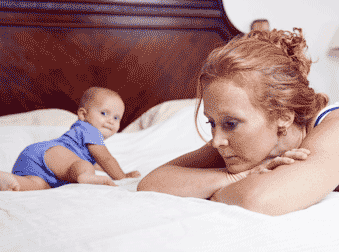In the last post we discussed the relatively unknown and misunderstood issue of Pre-Natal Depression.
In this post, we’re going to discuss the symptoms, causes, and treatments of Post-Natal Depression (often known as Postpartum Depression).
WHAT IS POSTPARTUM DEPRESSION?
 You may be familiar with what is commonly known as the “baby blues”. In fact, up to 80% of new mothers experience the “baby blues”.
You may be familiar with what is commonly known as the “baby blues”. In fact, up to 80% of new mothers experience the “baby blues”.
However, there is a more serious issue than the “baby blues” called Postpartum Depression (or PPD). It typically affects between 15 and 20 percent of new mothers. The difference is that the symptoms are often more severe and they last beyond the first couple of weeks after giving birth.
WHAT CAUSES POSTPARTUM DEPRESSION?
Hormones are a big factor. After childbirth, there are major and rapid hormonal changes. Additionally, there are major physical issues, such as body pain, sleep deprivation, issues with weight loss, and insecurity about attractiveness. What’s more, caring for a newborn can be extremely stressful. It can all seem overwhelming and can cause anxiety. Plus, there are issues of dealing with your new “identity” as a mom (or a mom of 2, etc).
WHAT ARE THE SYMPTOMS OF POSTPARTUM DEPRESSION?
If you are experiencing at least some of the following symptoms, you may have PPD.
- You feel overwhelmed. Not like “hey, this new mom thing is hard.” More like “I can’t do this and I’m never going to be able to do this.” You feel like you just can’t handle being a mother. In fact, you may be wondering whether you should have become a mother in the first place.
- You feel guilty because you believe you should be handling new motherhood better than this. You feel like your baby deserves better. You worry whether your baby can tell that you feel so bad, or that you are crying so much, or that you don’t feel the happiness or connection that you thought you would. You may wonder whether your baby would be better off without you.
- You don’t feel bonded to your baby. You’re not having that mythical mommy bliss that you see on TV or read about in magazines. Not everyone with PPD feels this way, but many do.
- You can’t understand why this is happening. You are very confused and scared.
- You feel irritated or angry. You have no patience. Everything annoys you. You feel resentment toward your baby, or your partner, or your friends who don’t have babies. You feel out-of-control rage.
- You feel nothing. Emptiness and numbness. You are just going through the motions.
- You feel sadness to the depths of your soul. You can’t stop crying, even when there’s no real reason to be crying.
- You feel hopeless, like this situation will never ever get better. You feel weak and defective, like a failure.
- You can’t bring yourself to eat, or perhaps the only thing that makes you feel better is eating.
- You can’t sleep when the baby sleeps, nor can you sleep at any other time. Or maybe you can fall asleep, but you wake up in the middle of the night and can’t go back to sleep no matter how tired you are. Or maybe all you can do is sleep and you can’t seem to stay awake to get the most basic things done. Whichever it is, your sleeping is completely screwed up and it’s not just because you have a newborn.
- You can’t concentrate. You can’t focus. You can’t think of the words you want to say. You can’t remember what you were supposed to do. You can’t make a decision. You feel like you’re in a fog.
- You feel disconnected. You feel strangely apart from everyone for some reason, like there’s an invisible wall between you and the rest of the world.
- Maybe you’re doing everything right. You are exercising. You are taking your vitamins. You have a healthy spirituality. You do yoga. You’re thinking “Why can’t I just get over this?” You feel like you should be able to snap out of it, but you can’t.
- You might be having thoughts of running away and leaving your family behind. Or you’ve thought of driving off the road, or taking too many pills, or finding some other way to end this misery.
- You know something is wrong. You may not know you have a perinatal mood or anxiety disorder, but you know the way you are feeling is NOT right. You think you’ve “gone crazy”.
- You are afraid that this is your new reality and that you’ve lost the “old you” forever.
- You are afraid that if you reach out for help people will judge you. Or that your baby will be taken away.
- More symptom info at PostPartumProgress.
WHAT SHOULD A MOTHER DO IF EXPERIENCING THESE SYMPTOMS?
Of course it’s important to take care of yourself as a new mother, like getting enough sleep, eating well, getting gentle exercise, and having time set aside for yourself.
However, if you’re either unable to take care of yourself (because of your symptoms), or if you’re still struggling despite your self-care, it’s extremely important to seek professional help.
**This reaches “urgent” status if you’re having feelings of hurting your baby or yourself.
There are a variety of treatments available. The key is to speak with a professional who understands prenatal mental health. Specifically, seek out a Reproductive Psychiatrist.
Treatments range from lifestyle changes to talk therapy to various medication options. A Reproductive Psychiatrist can help new mothers understand their treatment options and can help devise a treatment plan that is best for you and the baby.
NOTE: Dr. Amanda Itzkoff is a member of the American Society of
Reproductive Medicine and a qualified Reproductive Psychiatrist and
would be happy to help you locate a similarly qualified professional in your area!
For more information on the issue of Postpartum Depression, please contact our office at amanda.itzkoff@gmail.com. And, if you feel you could use additional help, please contact our office at 917-609-4990 to arrange a consultation.
Be Well,
Dr. Amanda Itzkoff
 .
.
